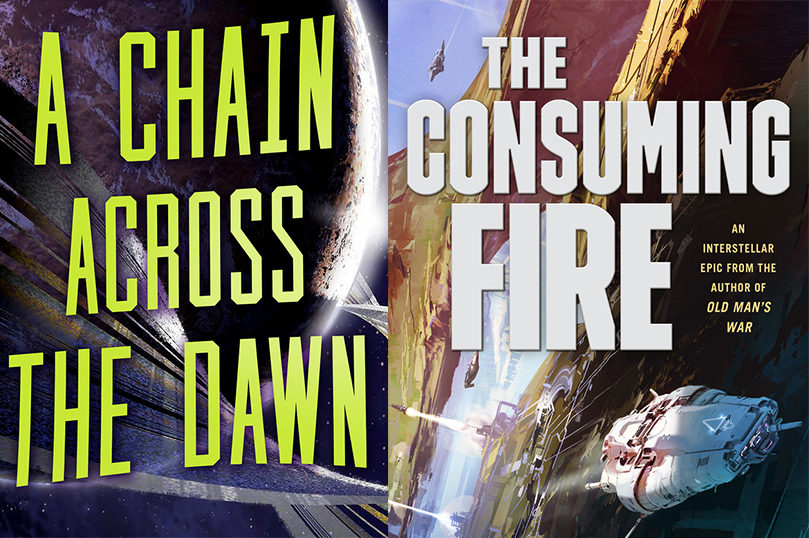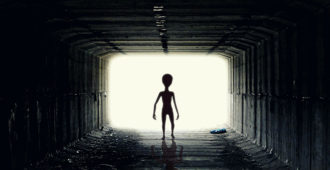What happens when two great sci-fi authors sit down for a conversation? Well, things get interesting. Check out A Chain Across the Dawn author Drew Williams’ conversation with Hugo Award-winning author John Scalzi below!
What made you decide to set your stories in space?
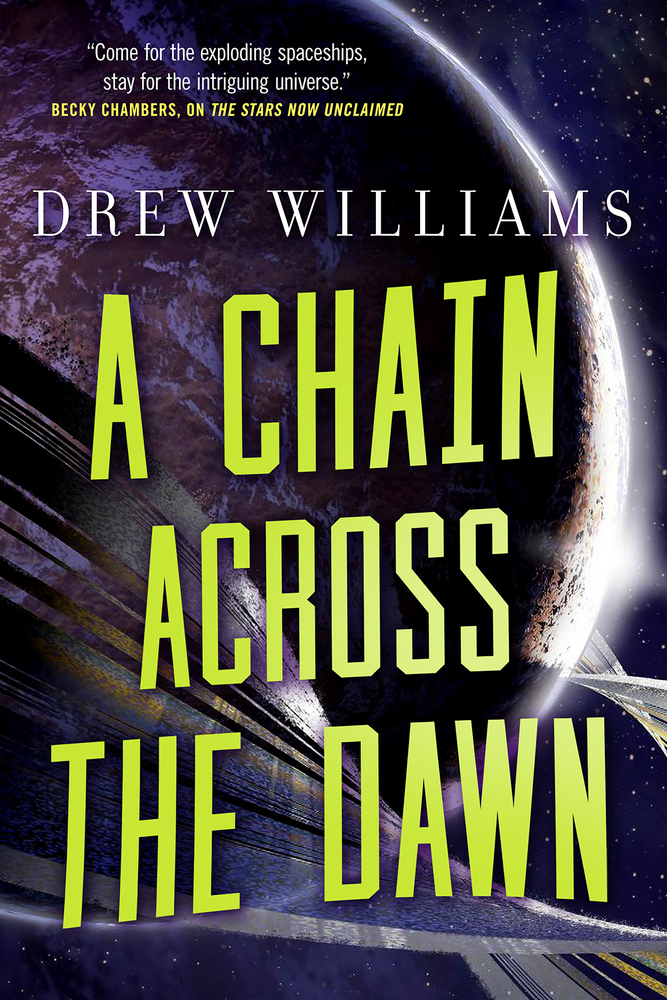 John Scalzi: Well, not all of them are set in space! A number of them are set here on the planet Earth. However, the ones that I have set in space, I mostly have because quite simply the action requires it one way or the other. The good news is, writing science-fiction, people are not surprised when suddenly they find themselves on a spaceship, or otherwise events taking place beyond a gravity wall.
John Scalzi: Well, not all of them are set in space! A number of them are set here on the planet Earth. However, the ones that I have set in space, I mostly have because quite simply the action requires it one way or the other. The good news is, writing science-fiction, people are not surprised when suddenly they find themselves on a spaceship, or otherwise events taking place beyond a gravity wall.
I do like setting stories in space. One of the nice things about it, is the possibilities it offers. To coin a phrase, it really is the Last Frontier, the place where you can pretty much get away with anything, as long as your story is internally consistent. As long as you can manage that then literally the sky’s the limit.
Drew Williams: Exactly – part of the joy of writing SFF is that you can make the universe reinforce whatever metaphor or thematic work you’re trying to accomplish. Does it help sell whatever idea you’re after if, I don’t know, all your characters can turn into bears? Then bam, everybody’s a bear when they need to be, and nobody’s like, ‘what the hell is up with all the bears?’ That’s just how their universe works; that’s the reality that they’ve always lived with. A reality full of werebears.
Space opera and adventure stories go in and out of style – why do you think they are popular at certain times, and less so at others?
DW: Time is a flat circle, or so sayeth Detective Cohle. No, I think public interest is just cyclical; whether it’s westerns or superheroes, detective novels or horror stories, what holds the cultural interest depends on a great many factors, some of which are complex metaphors created by the world we live in… and some are just based on ‘what’s been popular, and so everybody’s jumping on the bandwagon’.
JS: I agree with the idea that things are cyclical. Sometimes, people get saturated with stories about space and they just don’t want to dive into that anymore, they want something new and novel. At the same time, eventually it gets to where space and Space Opera becomes the Less Traveled Road, and therefore offer some excitement and novelty that they previously didn’t. It comes and goes, basically. The thing is even in the moments where it is not the hot thing, there is still an audience for it. So I think what it comes down to is you should write it if it’s interesting to you, and the people who want to read it will find it, hopefully.
If you were to join any spaceship crew, what would it be?
JS: The Apollo 11 crew. I’m sorry, Buzz Aldrin, I’m just going to have to take your place.
DW: I mean, as much as I’d love to say ‘the crew of the Serenity!’, just because I’d like to hang out with those characters… I don’t know, man. Reavers on one hand, various angry pirates and criminals on the other, the Alliance on the third hand… I would almost certainly die. I’d be, like, ‘special guest star’, the kind you know’s going to kick the bucket by the end of the episode.
Science fiction and space opera can run the gamut from serious to silly – how did you choose the tone for your books?
JS: I’m not sure I really chose the tone of my books. The tone of my books is mostly just me. I find that my own tone is sort of humorous, sort of snarky and basically that transfers onto what’s on the page. I can write stuff that is not my personal tone, see my novella The God Engines for that, but generally speaking at this point in time it seems that people actually like the tone that I use, so for most of the stuff that I write I’m just going to keep doing it that way.
DW: John, you’re absolutely right on that one; tone just happens, unless I’m actively trying for something else. I tend to have to work to edit out my own knee-jerk, smartass responses… assuming I even want to, which most of the time, I don’t. Because I think I’m hilarious. All right, time for some questions of my own! John – I know you spent part of your early career as a film critic; what would you say was the single most important non-literary of your work? (Doesn’t have to be film; I just figured that was a good lead-in.)
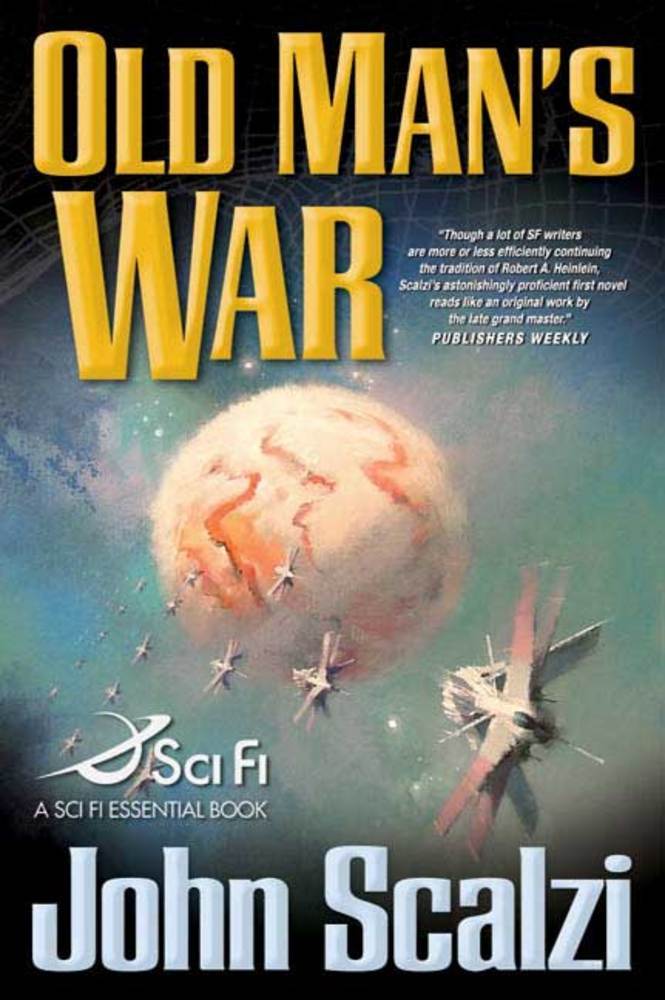 JS: Actually, as it happens film was a huge influence on how I write. I spent six years as a full-time newspaper film critic, so I was literally watching a film a day, and sometimes two films a day. You don’t spend that much time looking at storytelling, and not have it rub off. So if you look at Old Man’s War, for example, it looks very much like a film: it’s got a three-act structure, there’s lots of dialogue, and most of the description is functional rather than sort of ornate. So I would say actually film has been a huge influence. What about you?
JS: Actually, as it happens film was a huge influence on how I write. I spent six years as a full-time newspaper film critic, so I was literally watching a film a day, and sometimes two films a day. You don’t spend that much time looking at storytelling, and not have it rub off. So if you look at Old Man’s War, for example, it looks very much like a film: it’s got a three-act structure, there’s lots of dialogue, and most of the description is functional rather than sort of ornate. So I would say actually film has been a huge influence. What about you?
DW: Film, without a doubt – it’s definitely what I think of, structurally, when I’m trying to figure out pacing, or just generally ‘what happens next’. There’s an old story about George Lucas on the set of Star Wars saying, ‘Everything needs to go faster’, and that’s usually something I try to apply to my writing – as little description or internal dialogue as possible. Keep things moving, keep the audience engaged; go faster. (It doesn’t hurt that I don’t particularly enjoy writing description.)
JS: Raymond Chandler is supposed to have said if you ever write yourself in a corner, bring a man into a room with a gun. And in science fiction, I took that to mean if I write myself in the corner have a spaceship blow up. So if you look at some of my books and you see a spaceship blow up suddenly, that might be the reason.
DW: If your characters find themselves in a corner, blow out the bulkhead behind them and have them vented into space. Good news: they’re not in a corner anymore! Bad news: floating through space.
***
DW: When creating an alien/far-future culture, what matters more: where that culture differs from our current society, or what they have in common with us?
JS: I don’t know that I would say one has to matter more than the other. I think what happens is, if you are going to deviate from what we already know, you have to make sure that there’s a reason for it. There has to be something other than oh this would just be a cool thing to have them do. Has to have meaning, it has to have contacts within the larger culture, and it usually has to have something involving the plot as well.
As a practical matter, I do think you want to have something in common with our current culture. The reason for that is, aside from anything else, you need to give readers something they can hook into. So even if the rest of the culture is wildly different than ours, some small things that they can understand and grab hold of is a good thing. You don’t always have to do that, see Ted Chiang as an example of someone who makes truly alien creatures, but generally speaking, I think it’s a good idea.
DW: Essentially, then, there’s kind of a baseline – ‘can you create empathy with these characters’. It definitely feels like there is a point at which a culture is so alien that it becomes almost impossible to empathize with them (though, when it comes to authors who write that sort of thing, that’s often the entire point).
JS: I was just reading Children of Time by Adrian Tchaikovsky, and I think that that’s a good example of a book where you have aliens that are genuinely alien, yet at the same time the author makes them sympathetic to the reader. And he also has humans, and in the book the humans have a hard time identifying with the aliens, and they have to work to find some sort of common ground. It was nicely done, which is probably why that book won the Clarke Award.
DW: Damn you, authors that can pull off that balancing act! I mean… ahem. Well done, Tchaikovsky. Well done.
***
DW: Science fiction tends to lean either in a utopian direction, or, at the opposite end of the scale, toward a more cataclysmic/dystopian galaxy. Which variety of future do you think we’re closer to right now?
JS: Well, I think it depends on perspective. If you read the news, on a day-to-day basis, it really does feel like we’re moving towards a dystopia. But at the same time if you dig a little deeper, there are many things about progression of human civilization that are much more positive than we see on the day-to-day news. So a lot of it just depends on where you stand.
Personally, I think we’re in a moment where the politics is edging towards dystopia, in the idea that there is a lot of authoritarian and even Fascist governments that are on the rise recently. At the same time, it seems that there is a heightened awareness of how we are basically sabotaging the planet, and a lot of social awareness that we need to make changes, and that’s to all the good.
What I really think is happening, is something that is important for fiction writers to know, which is that dystopia and Utopia are not separate states, they can be happening at the same time.
DW: So rather than a pendulum, it’s a knife edge, with forces pulling us in either direction at any given time. The amount of human deaths attributable to war is way, way down in the last few decades; that’s good! We’re absolutely screwing up the climate, and the rise of fascist or autocratic regimes are endangering democratic norms we now take for granted; that’s bad. But we’re aware of the mistakes we’re making – much more so than previous generations were – so that’s good; we seem to lack the political will to actually do anything about them; that’s bad. (And now I’m Homer Simpson in the bit with the evil frozen yogurt machine.)
JS: At least we’ll get sprinkles!
DW: Most of the SFF authors I’ve talked to tend to have more ideas than novels: what’s one really cool concept you’ve never been able to fit into an actual work? (I promise not to steal it; I can’t say the same for anyone who reads this.)
JS: In my case, I have a very long book deal with Tor. And what that means for me, is that basically all the really cool ideas that I had, that I didn’t know that I wouldn’t necessarily be able to write, I pitched and Tor took! So I’m actually obliged to write out my really cool ideas sometime over the next decade. I know, I know, that’s really obnoxious. But I’ll take it!
I will say in a larger sense, there are some things that I want to work on, that I don’t have time for now, but I put them away possibly for later. For example, there is something that I want to do involving Christmas time, that I am surprised that no one else seems to have looked at. Very much in the sense of I was surprised that no one had actually written a novel about red shirts. It was something that everybody took to be just sort of joke length rather than the novel length. So, at some point or another in the hopefully not too far future you may see a Christmas-themed novel or novella from me. And when you do, remember that I mentioned it here first! What’s yours?
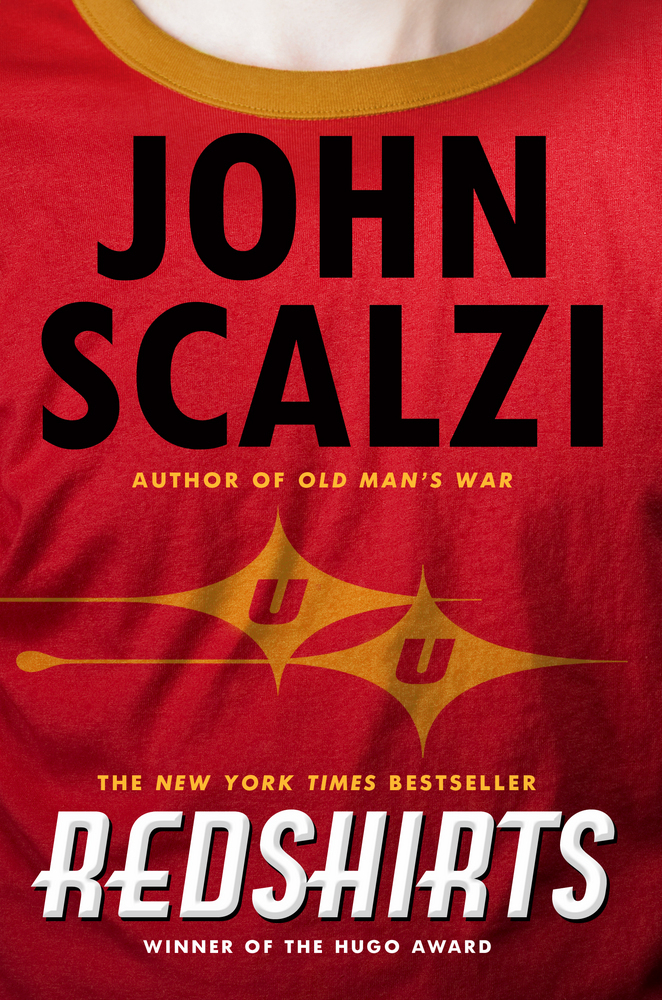 DW: Redshirts was definitely one of those ‘Man, how come nobody’s done this yet!’ concepts – it seemed so simple in retrospect, and you delivered perfectly on it; it’s always impressive when a writer manages to not just deliver on a concept, but also to build a narrative out of it that doesn’t entirely depend on just selling the concept. So well done!
DW: Redshirts was definitely one of those ‘Man, how come nobody’s done this yet!’ concepts – it seemed so simple in retrospect, and you delivered perfectly on it; it’s always impressive when a writer manages to not just deliver on a concept, but also to build a narrative out of it that doesn’t entirely depend on just selling the concept. So well done!
I tend to have ‘fragments of ideas’; little snippets that maybe, with enough time and attention, might become full novels, but most of which wouldn’t necessarily support even a short story, let alone a universe; I’ve been toying around with a fantasy notion where ‘magic’ is essentially rainfall – too little, and everything dies; too much and you have a natural disaster on your hands. Could there be a story in there? Possibly, but the idea in and of itself isn’t a story; it’s just an idea.
JS: Yeah, the thing that’s really hard to get across to non-writers is how it’s not the ideas that are the hard part. Ideas are all over the place, basically there for the picking up. The hard part is deciding which ideas are worth pursuing, and which are best left chucked back down onto the ground. So it’s not about the ideas or the quantity of ideas, it’s about the discrimination of ideas. Knowing which ones are the ones that are going to turn into interesting stories or novels, and which are just idle thoughts. And of course, the idea that I might not think is worth pursuing, might be the story that you win an award for! And vice versa.
DW: And just which ideas can fit together, in strange and interesting ways! A novel – or even a short story – takes more than one idea to get off the ground; figuring out which ones you can kind of jury-rig together, and which ones, when applied side-by-side, will implode the whole thing you’re trying to build… that takes, well something. Luck. Practice. More than a handful of implosions.
Order A Chain Across the Dawn:

